Anxiety and Depression Is a Real Issue
It’s growing deep within the pit of your stomach. Clawing its way up, constricting around airways, consuming every nerve. Your chest tightens, leaving no room for your lungs to expand. Your heart slams repeatedly back and forth into the walls of your ribcage.
Your skin is cool one second then uncomfortably hot the next. Half developed thoughts bounce around the inside of your skull, none of them being fully processed as you move erratically not accomplishing anything.
This is one of the many ways that anxiety can manifest itself.
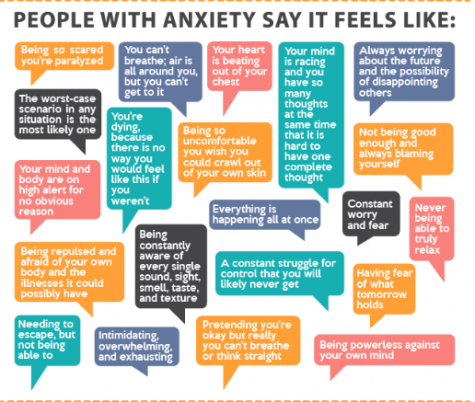
We all feel anxiety, or some sort of extreme stress. That is okay. Stress is the body’s reaction to a challenge. However, it’s about the duration, intensity, and the frequency that really determines if there is an illness. Anxiety is an overwhelming fear of the simplest things; worrying about going through the day perfectly and stressing over things outside of your control.
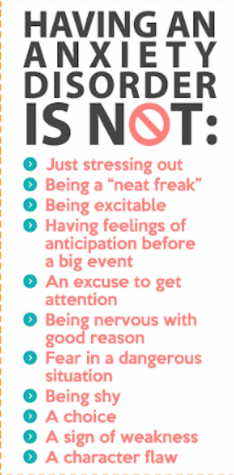 “The key difference is that stress is a reaction to something that is happening now and is triggered by a specific situation. Anxiety is concern about something that may or may not happen in the future. Anxiety is also the stress that continues after the stressor is gone,” said Melissa Cohen, LCSW Licensed Clinical Social Worker. “For some, it is when thoughts and feelings begin to prevent them from being able to focus and enjoy the important things in life,
“The key difference is that stress is a reaction to something that is happening now and is triggered by a specific situation. Anxiety is concern about something that may or may not happen in the future. Anxiety is also the stress that continues after the stressor is gone,” said Melissa Cohen, LCSW Licensed Clinical Social Worker. “For some, it is when thoughts and feelings begin to prevent them from being able to focus and enjoy the important things in life,
when their stress and anxiety are the only thing they can focus on, or when their thoughts and feelings begin to interfere with work or school.”
Anxiety, is the body’s reaction to just about everything and anything. What is surprising, is that the amount of people who experience anxiety. According to a survey from the American Psychological Association, half of the students surveyed stated they experienced anxiety at least once within the last 12 months. More than 20 percent of people between the ages of 18-24 are diagnosed with anxiety annually. That is 42.5 million people a year.
That’s more than the number of people who subscribed to Netflix in 2015.
What’s even more surprising is that many of the people experiencing anxiety was predisposed to the illness because of genetic coding. In layman’s terms, the person’s family has a history of anxiety, and therefore, the illness is in their DNA.
So what can help?
“For some people, it’s time to seek help when your feelings begin to have a negative impact on everyday life and your ability to carry out daily routines or have normal relationships,” said Cohen.
Mental Health America suggests excercises like distracting yourself from what is causing the anxiety, writing it down, taking deep breaths to calm down, doing something physical so the body is using this anxious energy another way, and even allowing the an anxiety attack to pass in a safe and quiet environment. Unfortunately, this isn’t the only mental health disorder that college students suffer from. Nearly 13 percent of college students are diagnosed with depression and anxiety or ano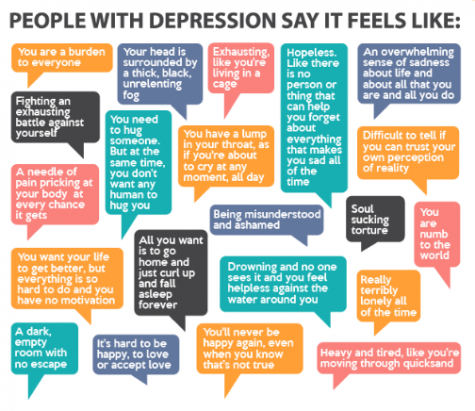 ther mental health conditions.
ther mental health conditions.
Depression isn’t just being sad. It’s much more. It’s an aching feeling in your chest that doesn’t fade but morphs into a slow ebbing cold throb. Everything slows down, so far down it fades away. It’s anything that once mattered no longer mattering even in the slightest. Its not being able to concentrate, comprehend, or care. Its falling out of love with everything all at once.
We’ve all been sad before. We know what that feels like but depression is not only being sad. Its how long we’re feeling low for, how sad we are, and how often we feel this way that should make us worry if we are depressed. According to Healthline, 44 percent of Am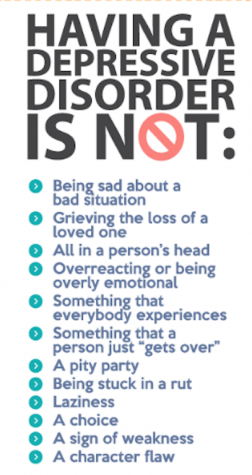 erican college students report having symptoms of depression. These symptoms can vary greatly but are generally, sadness for longer than three weeks, self-loathing, loss of energy, irritability, helplessness, losing interest in activities you used to enjoy, sleep changes, reckless behavior, as well as changes in behavior or attitude. In addition to having emotional changes there are also a large amount of physical symptoms and changes as well such as, drastic weight loss/gain, headaches, body aches, and a weakened immune system.
erican college students report having symptoms of depression. These symptoms can vary greatly but are generally, sadness for longer than three weeks, self-loathing, loss of energy, irritability, helplessness, losing interest in activities you used to enjoy, sleep changes, reckless behavior, as well as changes in behavior or attitude. In addition to having emotional changes there are also a large amount of physical symptoms and changes as well such as, drastic weight loss/gain, headaches, body aches, and a weakened immune system.
Experiencing depression can be a scary point in the sufferer’s life. Many sufferers describe the feeling as being stuck for an unknown reason, or engulfed in darkness, without any clear escape. 1 out of every 4 college students suffers from some form of mental illness, including depression. Unfortunately, every person experiences depression differently. With depression some sufferers experience all of the symptoms where some experience only a few of them. One person with depression will feel differently from another who also has depression. The time it takes to recover also varies from person to person but the most important thing to remember that recovery will happen.
There is no cure for depression but there are treatments and ways to help. Do something that you love or used to love! Move around as much as possible! Exercising releases endorphins which has been proven to help make someone feel better. Write down the three things that you’re grateful for everyday or when things get stressful or too much, make lists! Keep your friends and family close. They will be your best support system.
If you think you know someone who has depression remind them that you are there for them. Make s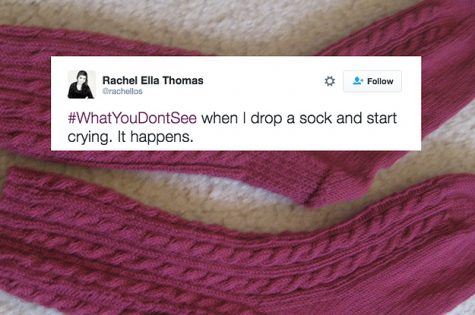 ure to be an active listener and encourage open communication. Most importantly express how important the person is to you. Be honest and tell the sufferer that you are worried about them and try to have an honest conversation about what types of emotions they have been experiencing. If possible a doctor or mental health professional to help come up with a solution to overcome the depression. This step is sometimes the most critical and needed to help the sufferer become themselves again.
ure to be an active listener and encourage open communication. Most importantly express how important the person is to you. Be honest and tell the sufferer that you are worried about them and try to have an honest conversation about what types of emotions they have been experiencing. If possible a doctor or mental health professional to help come up with a solution to overcome the depression. This step is sometimes the most critical and needed to help the sufferer become themselves again.
Depression and anxiety are so common with college students but it’s spoken so little about. If you are suffering from any of these things, break the silence. Speak up, ask for help. 75 percent of college students do not seek help for mental health problems and this then can lead to other serious mental health concerns such as suicide. Suicide is the third leading cause of death among college students and is totally preventable. Young people, such as college students, diagnosed with depression are five times more likely to attempt suicide than adults. So please, be aware of those around suffering from depression and encourage the sufferer to get help.
If you need help contact the National Suicide Prevention Hotline at: (800) 273-8225 anytime of the day, seven days a week. If online help is something that is more comfortable then visit healthfulchat.org.

Christine is an English major who reads too much of things that would make others vomit for fun. By day she is a wannabe yogi while at night she tames...

Faith Rodriguez is a fifth year senior studying behavioral science. She has an interest in all things media. She is a kindergarten after school teacher....








